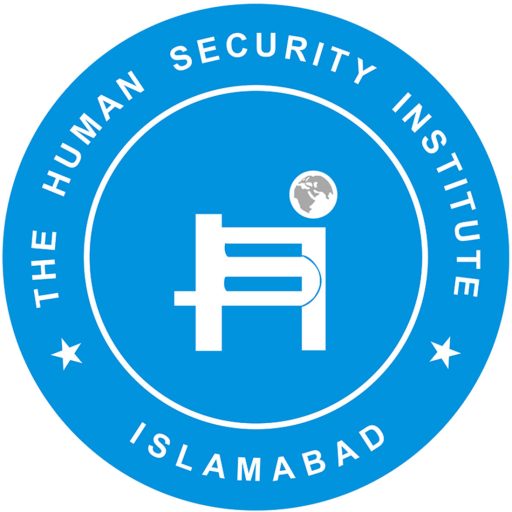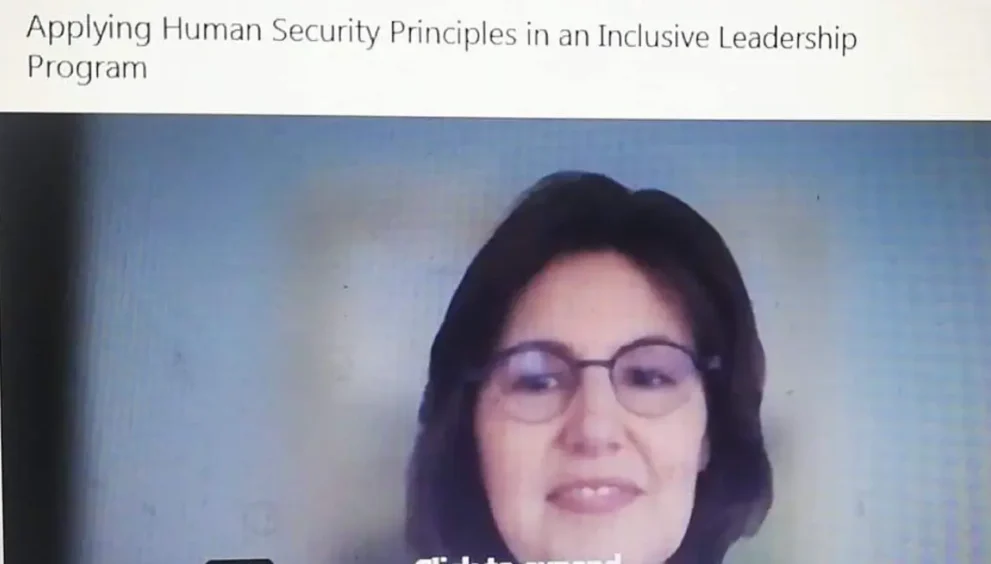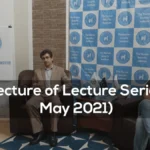The Human Security Institute
Minutes of the 7th lecture of Lecture Series on “Exploring the Dimensions of Human Security”
Topic of the Lecture: Applying Human Security Principles in an Inclusive Leadership
Guest Speaker: Jeanne Abdulla
Date: May 27, 2021
Time: 01:00 pm
Brief Introduction to Human Security:
The state security is not sufficient in this age. A state alone cannot mitigate threats posed to individuals. Human security prioritizes the prevention conflicts and address the root of cause of violence. Further, it advocates human rights, people-centered development, and security. As it is said’ “Security requires people to be able to speak out and act freely and fearlessly.” Human security includes political security, personal security, economic security, community security, health security, food security, and environmental security.
- Human Security: the UN approach. The UN’s Development Report of 1994 formally introduced the term ‘Human Security’ in the UN system. Now the organization runs various projects on human security around the world.
- Paradigm Shift (from Traditional security of the state to human security). For centuries, the states keep their focus on traditional security. But now new challenges have been emerged that requires to focus on ‘Hard security and soft security’.
- Classical Security Context (during the cold, the world was divided into two groups: Communist and Capitalist bloc). At that time, all the countries were focused on state security. These countries massively militarized themselves and did not heed towards human security.
- Evolving Security Threats are requiring prioritizing human security because state alone cannot afford to mitigate complex challenges. So, human security is a viable solution for complex problems.
- Central theme of human security is ‘Freedom from Want, Freedom from Fear, Human dignity’. People must be free from violence, threats, and disasters that are posed by the man or by nature.
- Complex Security Threats need both state-level and community-level, human security, solutions.
The state security focuses on a state; dependent on military might; maintains by the state institutions; has less concerned about global security; and its aim is to increase military capacity. On the other hand, human security’s preferences are individuals, human rights, and human development.
Brief Introduction on the role of Civil Society in a Human Security approach towards safety in communities:
Around the world Civil Societies (CSs) are non-profitable organization, and they are working with collaboration with governments, corporations, and volunteers. Moreover, CSs help governments to solve complex issues in order to prevent violence and sustain the dignity of humankind. Their goal is betterment of individuals, communities, and societies.
- How to define Civil Society (non-profitable organizations and working for the betterment of the communities and individuals). Civil Societies are supplementing the security infrastructure of the state. Moreover, they emphasize the need for local ownership and to strengthen the relationship between the government and civil society. ‘Civil society is the space for collective action around shared interests, purposes and values, generally distinct from government and commercial for-profit actors.’
- Protection of Civil Society (governments and international laws provides protection). Right to free expression and to seek and secure resources should be protected by the state.
- Good practices and principles of Civil Society engagement (empowerment of people, communities, and societies). Its goals are to maintain human rights, women’s right, freedom of speech and the rights and freedom to associate are not hampered.
Brief introduction to applying Human Security principles to an Inclusive Leadership program:
Conflict transformation is effective in analyzing conflicts in the society. The Inclusive Leadership program (ILP) is a designed program based on envisioning, empowering, engaging, and adaptive learning. Human Security Collective has designed ILP in three workshops. ILP goal is to project implementation and strengthening of human security network. Human Security Collective, and Hague-based organization, conducted a study based on collective negotiations between Dutch and other migrant communities to find the answer that why people of Delf joining Syrian conflict. The study shown that the marginalized communities with fewer privileges join the conflicts. ‘A Turkish or Moroccan citizen was asked to show his ID.’
- Structure HSC trajectory (three workshops and output). These including Envisioning, empowering, and engaging are main part and parcel of an Inclusion Leadership Program conducted by the Jeanne’s organization. It further provides knowledge and skills to contribute towards human security. And this is based on negotiations between migrant communities and Dutch. The organization recently arranged a meeting between the foreign minister and the migrant people.
Case study of Netherlands:
There are two kind of properties in Netherlands: social property and private property. Social property is for the people with low incomes. And this sector is mainly managed by housing associations. As it is mentioned above that a few Delft people became the first Dutch foreign fighter who died in Syria in March 2013. Due to this incident various studies had been conducted to find the causes behind this tragedy. Human security collective also conducted a study on it, which shown that people of Delft are more marginalized and faces victimized; therefore, they are joining Syrian fight. Moreover, the people of its neighborhood, De Buitenholf, are more peaceful and not a single person on this city join foreign fight because they are more dependent and have more rights.
- Neighborhood in Delft (De Buitenhof has more social properties and lesser private properties as compared to Delft). De Buitenhof has 76 social properties and 24 private properties, whereas Delft has 62 social properties and 38 private properties.
- Ethnicity of the neighbourhood (combined ethnicity of European and Netherlands in De Buitenhof is less than 50 %; and the second and third generation migrants count more than 50 % in the city.)
Short BIO of speaker
Ms Jeanne Abdulla is the Director of Programmers Human Security Collective, The Netherlands. She is the Co-founder of Human Security Collective. She is the Co-founder of Human Security, and set up the program of Inclusive Leadership and managed to obtain funding to roll out programmers in the Middle East (Palestine, Tunisia and Libya), The Netherlands, East and West Africa, the Philippines and East Europe (Kosovo and Bosnia). Being the Director of Programs, she works with local partners from the Middle East (Palestine, Libya and Tunisia) and the Netherlands to capacitate young leaders to engage with key players at the local, national and international levels that have an authority with regard to their human security. These young leaders are also supported in developing and implementing innovative community approaches to improve the daily safety in their communities. She also has expertise in common-ground methodologies (Future Search), non-violent communication (NVC), empathy, deep dialogue (Deep Democracy), appreciative listening, peer-to-peer and adaptive learning.



